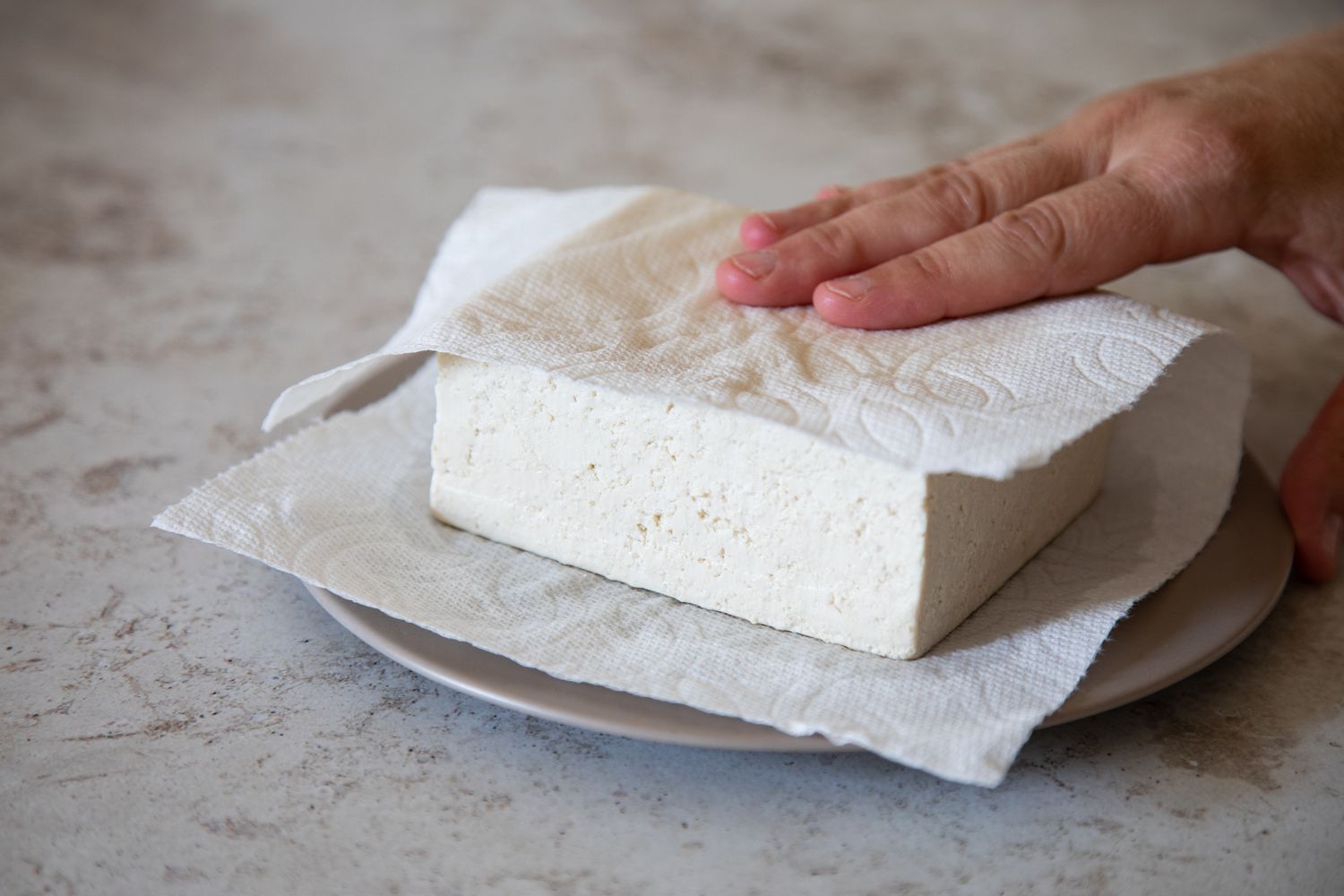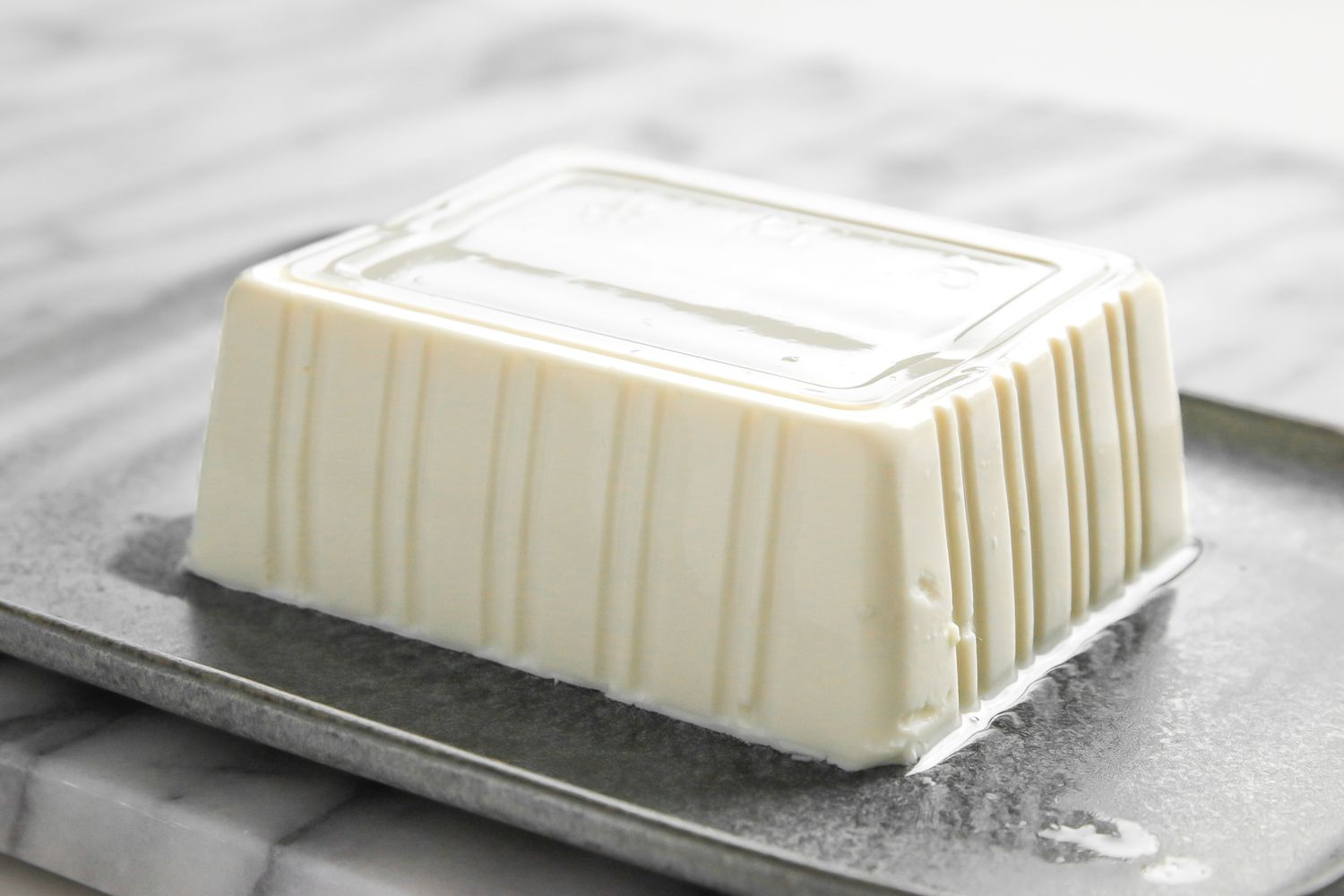

Articles
How To Store Tofu After Pressing
Modified: January 18, 2024
Learn the best methods for storing tofu after pressing in this helpful article. Keep your tofu fresh for longer with these storage tips.
(Many of the links in this article redirect to a specific reviewed product. Your purchase of these products through affiliate links helps to generate commission for Storables.com, at no extra cost. Learn more)
Introduction
Tofu, also known as bean curd, is a versatile and nutritious plant-based protein that has gained popularity in recent years. It is made by curdling soy milk and then pressing the curds into a solid block. Pressing tofu helps remove excess water, resulting in a firmer texture and better absorption of flavors.
After pressing tofu, it is crucial to store it properly to maintain its freshness, flavor, and integrity. This ensures that the tofu remains in a suitable condition for use in various recipes, including stir-fries, salads, soups, and even desserts. In this article, we will explore the importance of pressing tofu and share the best methods for storing it afterward.
By following these guidelines, you can maximize the shelf life of your pressed tofu and enjoy its delicious taste and texture in your culinary creations.
Key Takeaways:
- Properly pressing tofu is crucial for enhancing flavor absorption, improving texture, reducing cooking time, and extending its shelf life. By following the step-by-step guide, you can achieve better results and elevate your culinary creations.
- Utilizing the water storage, airtight container, or freezing method ensures that your pressed tofu remains fresh, flavorful, and ready to be used in a wide range of delicious recipes!
Read more: How To Store Tofu
Why Press Tofu?
Pressing tofu is an essential step for several reasons. Firstly, pressing removes excess water from the tofu, allowing it to absorb marinades and flavors more effectively. When tofu is not pressed, it retains excessive moisture, resulting in a softer texture and limited flavor absorption.
Additionally, pressing tofu creates a firmer texture, making it easier to handle and cook. Pressed tofu holds its shape better, preventing it from crumbling or falling apart while cooking. Whether you’re stir-frying or grilling tofu, pressing ensures that it maintains its structure during the cooking process.
Pressed tofu also has a more appealing texture when eaten. The removal of excess water gives the tofu a denser and chewier consistency. This improved texture enhances the overall eating experience by providing a satisfying mouthfeel.
Furthermore, pressing tofu can help reduce cooking time. Since pressed tofu has less moisture, it cooks more quickly and evenly. This is particularly beneficial when searing or frying tofu, as it can develop a crispy exterior without becoming too dry on the inside.
Lastly, pressing tofu helps improve its shelf life. By removing excess water, you minimize the risk of bacterial growth and spoilage. Pressed tofu can be stored for longer periods, allowing you to enjoy it over multiple meals without sacrificing quality.
In summary, pressing tofu is crucial for enhancing flavor absorption, improving texture, reducing cooking time, and extending its shelf life. By taking the time to press tofu before using it in your dishes, you can achieve better results and elevate your culinary creations to new heights.
Pressing Tofu: Step-by-Step Guide
Pressing tofu is a simple process that can be done using basic kitchen tools. Here is a step-by-step guide to help you press tofu effectively:
- Start by selecting the desired type of tofu. Firm or extra-firm tofu works best for pressing, as they have a higher water content that needs to be removed. Silken or soft tofu varieties are not suitable for pressing as they have a delicate texture.
- Remove the tofu from its packaging and drain any excess liquid. Place the tofu block on a clean kitchen towel or a stack of paper towels to absorb moisture.
- Wrap the tofu in the towel or paper towels, making sure to cover it completely. Press gently with your hands to remove initial moisture.
- Place the wrapped tofu on a cutting board or a flat surface. Place a heavy object, such as a cast-iron skillet or a stack of books, on top of the tofu to apply pressure.
- Leave the tofu under the weight for at least 30 minutes, or up to an hour for even firmer tofu. The longer you press the tofu, the more water will be removed, resulting in a firmer texture.
- After pressing, unwrap the tofu and discard the damp towel or paper towels. Your tofu is now ready to be used in various recipes that call for pressed tofu.
Remember to clean and dry the cutting board, knife, and any other utensils used during the pressing process to avoid cross-contamination.
Note that tofu can be pressed using a tofu press, which is designed specifically for this purpose. These presses provide consistent pressure and can be more convenient to use, but the steps are essentially the same.
By following this step-by-step guide, you can easily press tofu at home and enjoy the improved flavor, texture, and cooking properties that come with properly pressed tofu.
Importance of Properly Storing Pressed Tofu
After taking the time to press tofu, it is equally important to store it properly to maintain its freshness and quality. Improper storage can lead to flavor loss, spoilage, and the growth of harmful bacteria. Here are some key reasons why properly storing pressed tofu is crucial:
1. Freshness: Proper storage helps to preserve the freshness of the tofu. When stored correctly, pressed tofu maintains its desirable texture and flavor, allowing you to enjoy it in various dishes for a more extended period.
2. Prevention of Spoilage: Pressed tofu has a lower moisture content compared to its unpressed counterpart. This reduced moisture level helps to prevent bacterial growth that can lead to spoilage. By storing pressed tofu correctly, you can prevent the growth of harmful bacteria and ensure its safety for consumption.
3. Enhanced flavor absorption: Pressed tofu has a more porous texture, allowing it to absorb flavors more effectively. By storing pressed tofu properly, you can preserve its ability to absorb marinades, sauces, and seasonings, enhancing its taste and making it more versatile in your recipes.
4. Extended Shelf Life: Proper storage methods can significantly extend the shelf life of pressed tofu. By minimizing exposure to air and controlling temperature, you can keep the tofu fresh and prevent it from spoiling too quickly. This allows you to prepare meals ahead of time or store leftovers for future use.
5. Cost-effectiveness: Properly storing pressed tofu can help you avoid wastage. When stored correctly, tofu retains its quality, and you can confidently use it in various recipes, rather than having to discard it due to spoilage or flavor deterioration.
By understanding the importance of properly storing pressed tofu, you can maximize its shelf life, maintain its flavor and texture, and enjoy its benefits in your favorite tofu dishes. Let’s explore some of the best methods for storing pressed tofu to ensure its freshness and longevity.
Best Methods for Storing Pressed Tofu
Proper storage is crucial to maintain the freshness, flavor, and texture of pressed tofu. Here are three of the best methods for storing pressed tofu:
1. Water Storage Method:
In this method, store the pressed tofu in water to keep it moist and fresh:
- Place the pressed tofu in an airtight container or a bowl.
- Add enough water to cover the tofu completely.
- Seal the container tightly and refrigerate.
- Change the water every 1-2 days to maintain freshness.
This method is ideal if you plan to use the tofu within a few days.
2. Airtight Container Method:
Using an airtight container helps to minimize air exposure and keep the tofu fresh:
- Place the pressed tofu in an airtight container.
- Wrap the tofu in a damp paper towel or cloth to prevent drying.
- Secure the lid tightly.
- Store the container in the refrigerator.
With this method, the tofu can last for around 3-5 days, depending on its initial freshness. Remember to change the damp paper towel or cloth if it becomes too wet.
3. Freezing Method:
Freezing pressed tofu is an excellent option if you want to store it for an extended period:
- Wrap the pressed tofu tightly in plastic wrap or place it in a freezer-safe container.
- Label the tofu with the date to track its freshness.
- Place the tofu in the freezer.
Frozen tofu can be stored for up to three months. When ready to use, thaw the tofu in the refrigerator overnight and squeeze out any excess water before cooking.
Remember to keep the tofu away from other strong-smelling items in the fridge or freezer to prevent flavor transfer.
Choose the storage method that best suits your needs and the duration you plan to store the pressed tofu. Additionally, always check the tofu for any signs of spoilage or off flavors before use.
By following these storage methods, you can ensure that your pressed tofu remains fresh, flavorful, and ready to be used in a wide range of delicious recipes!
After pressing tofu, store it in a container filled with fresh water and keep it refrigerated. Change the water every day to maintain freshness and extend its shelf life.
Read more: How To Store Cooked Tofu
Option 1: Water Storage Method
The water storage method is a popular way to store pressed tofu, keeping it moist and fresh. Follow these steps to store your pressed tofu using the water storage method:
- Start by pressing the tofu using the step-by-step guide mentioned earlier in this article.
- Once the tofu is pressed, place it in an airtight container or a bowl.
- Add enough water to completely submerge the tofu. Make sure the water covers the tofu entirely.
- Seal the container tightly to prevent water from evaporating or any outside odors from seeping in.
- Place the container in the refrigerator.
- For optimal freshness, it is recommended to change the water every 1-2 days. This helps to maintain the quality of the tofu and prevent any off-flavors.
The water storage method works well when you plan to use the tofu within a few days. The water helps to preserve the moisture content, ensuring that the tofu remains soft and fresh.
When you’re ready to use the tofu, simply remove it from the container and gently pat it dry with a clean paper towel or kitchen cloth. You can then proceed to incorporate it into your desired recipes.
It’s important to note that when using the water storage method, the tofu may absorb some water and may appear slightly less firm compared to when it was freshly pressed. However, the water-infused tofu can still be used in various dishes, providing a tender and moist texture.
Remember to monitor the water quality and the tofu’s freshness during storage. If you notice any signs of spoilage, such as a sour smell or unusual texture, it’s best to discard the tofu.
The water storage method is a convenient way to store pressed tofu and maintain its desired texture and moisture. Give it a try and enjoy the freshness of your tofu in your favorite recipes!
Option 2: Airtight Container Method
The airtight container method is another effective way to store pressed tofu, preserving its freshness and texture. Follow these steps to store your pressed tofu using this method:
- Begin by pressing the tofu using the step-by-step guide provided earlier.
- Once the tofu is pressed, place it in an airtight container.
- Before sealing the container, wrap the tofu in a damp paper towel or cloth. This helps to prevent the tofu from drying out.
- Ensure that the container is tightly sealed to minimize air exposure, which can cause the tofu to spoil more quickly.
- Label the container with the date to keep track of its freshness.
- Store the container in the refrigerator.
The airtight container method helps to maintain the texture and flavor of the tofu for a few days. The damp paper towel or cloth helps to retain moisture and prevent the tofu from becoming too dry.
This method is particularly useful when you plan to use the tofu within 3-5 days. However, keep in mind that the texture of the tofu may slightly change over time, becoming firmer as it continues to lose moisture.
When you’re ready to use the tofu, simply remove it from the container and unwrap it from the damp paper towel or cloth. You can then slice, dice, or crumble the tofu as needed for your recipe.
Remember to check the tofu for any signs of spoilage, such as an off smell, mold, or sliminess, before using it. If you notice any of these signs, it’s best to discard the tofu to avoid any potential health risks.
The airtight container method is a convenient way to store pressed tofu while maintaining its freshness and texture. Give it a try and enjoy the versatility of your tofu in various dishes!
Option 3: Freezing Method
The freezing method is an excellent option for long-term storage of pressed tofu. Freezing tofu helps to preserve its freshness and extends its shelf life. Follow these steps to store your pressed tofu using the freezing method:
- Press the tofu using the step-by-step guide provided earlier in this article.
- Once the tofu is pressed, wrap it tightly in plastic wrap or place it in a freezer-safe container.
- Label the tofu with the date to keep track of its freezing time.
- Place the wrapped tofu in the freezer, ideally in a single layer to facilitate even freezing.
When properly frozen, tofu can be stored for up to three months. Freezing tofu changes its texture, making it more spongy and chewy. This altered texture allows the tofu to absorb flavors more readily when thawed and used in recipes.
To use the frozen tofu, follow these thawing steps:
- Remove the frozen tofu from the freezer and transfer it to the refrigerator.
- Allow the tofu to thaw slowly in the refrigerator overnight or for at least 8 hours.
- Once completely thawed, gently squeeze out any excess liquid from the tofu.
Thawed tofu may appear darker or yellowish due to the change in texture but is perfectly safe to consume. The thawed tofu is now ready to be used in various dishes such as stir-fries, curries, or soups.
It’s important to note that freezing tofu affects the texture, and it becomes more porous and absorbs flavors more readily. This makes frozen and thawed tofu a great addition to recipes that call for marination or seasoning.
However, if you prefer the original texture of pressed tofu, it’s best to avoid freezing as it may alter the desired consistency.
By freezing your pressed tofu, you can extend its shelf life and have tofu readily available for future use. Just ensure that the tofu is properly thawed before incorporating it into your recipes.
Tips for Maintaining Freshness and Flavor
To ensure that your pressed tofu remains fresh and flavorsome, here are some helpful tips:
- Storage Duration: It’s best to use pressed tofu within a few days of pressing. While water storage and airtight container methods can keep tofu fresh for a short time, it’s important to check for any signs of spoilage before using it.
- Proper Handling: Always handle pressed tofu with clean hands and utensils to avoid cross-contamination. This helps maintain its freshness and prevents unwanted bacteria or mold growth.
- Sealing Containers: Whether you choose the water storage or airtight container method, ensure that containers are properly sealed to minimize air exposure. This will help preserve the flavor and texture of the tofu.
- Monitoring: Regularly check the stored tofu for any signs of spoilage, such as an unusual smell, sliminess, or mold growth. If any of these signs are present, discard the tofu to prevent any potential health risks.
- Labeling: If you prefer to store tofu for a longer period, it’s helpful to label the container with the date of storage. This will help you keep track of how long the tofu has been stored, enabling you to use it within the recommended timeframe.
- Quality Check: Before using pressed tofu in your recipes, give it a quality check by sniffing and examining its appearance. Fresh tofu should have a mild, pleasant aroma and a consistent color. Any off smells or signs of spoilage should warrant discarding the tofu.
- Cutting Portions: If you plan to use only a portion of the pressed tofu, it’s advisable to slice or cut off the desired amount while keeping the rest sealed or stored separately. This prevents unnecessary exposure of the remaining tofu to air or contaminants.
- Flavor Enhancements: To enhance the flavor of pressed tofu, consider marinating it before storing. This allows the tofu to absorb the flavors of the marinade, adding an extra layer of taste when it’s used in your recipes.
By following these tips, you can maintain the freshness and flavor of your pressed tofu, allowing you to enjoy its versatile qualities in a variety of dishes.
Read more: How To Properly Store Tofu
Conclusion
Properly storing pressed tofu is essential for maintaining its freshness, texture, and flavor. Pressing tofu removes excess water, resulting in a firmer texture and improved flavor absorption. By following the steps and utilizing the best storage methods, you can ensure that your pressed tofu remains in optimal condition for use in your favorite recipes.
The water storage method keeps pressed tofu moist and ready for use within a few days. Regularly changing the water helps maintain its freshness and minimizes the risk of spoilage. The airtight container method, on the other hand, keeps tofu fresh for a slightly longer duration, around 3-5 days. Wrapping the tofu in a damp paper towel or cloth helps prevent the tofu from drying out.
If you are looking for a long-term storage option, freezing pressed tofu is a great choice. Frozen tofu can be stored for up to three months. Thawing the tofu in the refrigerator ensures that it retains its desired texture and is ready for use in various recipes.
Regardless of the storage method you choose, it’s important to monitor the tofu for any signs of spoilage, such as off smells, mold, or sliminess. Always use your judgment and discard any tofu that appears to be unsafe for consumption.
By implementing proper storage techniques and following the recommended tips, you can maximize the shelf life of your pressed tofu, prevent wastage, and enjoy its delicious taste and versatile uses in your culinary creations.
Next time you press tofu, remember to store it correctly and savor the benefits of properly stored pressed tofu in your favorite dishes.
Frequently Asked Questions about How To Store Tofu After Pressing
Was this page helpful?
At Storables.com, we guarantee accurate and reliable information. Our content, validated by Expert Board Contributors, is crafted following stringent Editorial Policies. We're committed to providing you with well-researched, expert-backed insights for all your informational needs.














0 thoughts on “How To Store Tofu After Pressing”